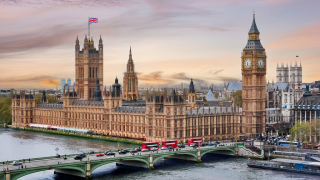
But 2024 can still be a significant year for animals in UK laboratories
We are disappointed that the first official King’s Speech from King Charles III failed to mention the need to protect animals from suffering and death in UK laboratories, and the need for the government to deliver on promises that will help to move away from testing on animals.
There was not a single reference to animal protection and the issue has seemingly slipped further down the list of priorities of this government, with the scope of their animal welfare ambitions much reduced and some recent actions taking backward steps in the protection of animals used in science.
In addition to the revelation of the government’s secret abandonment of the ban on animal testing for cosmetics – due to our legal challenge on the policy, which was heard in January and published in May – and the dropping of The Kept Animals Bill, this Speech illustrates just how little the government cares about the suffering of animals, particularly those who suffer in laboratories.
Following pressure from both ourselves and the public, the government partially reinstated the cosmetics testing ban in May, but only to cover the 20% of ingredients which are used exclusively in cosmetics. In her statement on the policy, the Home Secretary also said that the government were actively seeking alternatives to animal testing.
In response, we have launched our #PledgeCrueltyFree campaign, to ask UK citizens to take their own steps to support policies which will begin the end of animal testing in the UK and let MPs know how important this issue is to the electorate in the build-up to the 2024 General Election.
As part of the pledge, members of the public can ask their MP to make a commitment to put the 1998 cosmetics testing ban, covering ingredients used both predominantly and exclusively in cosmetics, into law; make our homes safer by removing animals and modernising the system for testing the chemicals that go into the products we use every day, such as food, clothes, household cleaning, furniture, electronic goods, paints and dyes; and ask that the government create a plan to phase-out animal testing forever, with a minister dedicated to the delivery of this plan across all departments.
These actions are precisely the kind of long-term decisions in the interest of future generations that the country is in need of. In a world where the future of public health and the safety of our environment will be shaped by our ability to encourage and harness innovation and technological advance, the government can and must play an active role. It is important now that we take the opportunity to drive the development and uptake of forward looking human-specific science, which delivers better outcomes for people, the planet and animals in laboratories.
Our Head of Public Affairs, Dylan Underhill, says: “Once again, the Kings Speech has been a missed opportunity. The government has shown time and again that they don’t take the suffering of animals in laboratories, or the opportunities presented by non-animal innovations, seriously. In the year that the government admitted it had secretly abandoned the ban on animal testing for cosmetics this is yet another reminder that to save those animals who suffer the cruel fate of life in a laboratory we need to step up and make our voices heard.
We urge all Parliamentarians to pledge cruelty free and give their support to these popular and positive policies. Those Members of Parliament and the House of Lords who are successful in the Private Members Bill ballot can help to fill the gaping hole left by the government. We stand ready to help them.”
Whilst we are disappointed at the absence of animal protection legislation from the King’s Speech, there is still much that can be done by the government to reduce the suffering of animals in laboratories, including:
- The proper enforcement of rules to ensure that no animal test is conducted when an approved non-animal method is available, as illustrated in our RAT List
- Reprioritise funding towards the research and development of non-animal testing methods, which would boost both our economy and status as a scientific superpower
- Start work on writing and delivering a plan to phase-out animal testing, with clear, deliverable milestones and achievable targets
You can #PledgeCrueltyFree, to show your support for policies to end animal testing in the UK – including sending an email to your local MP below.
